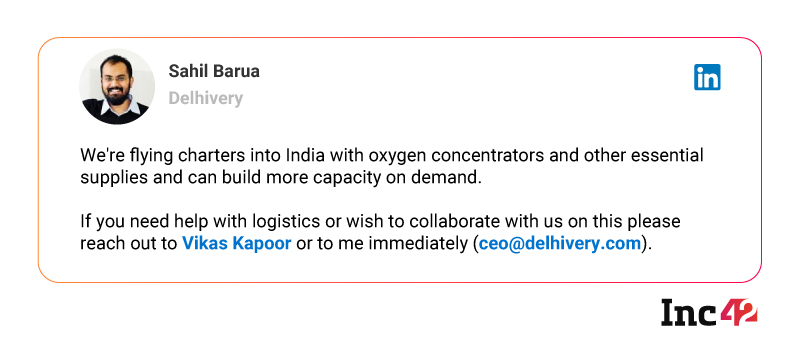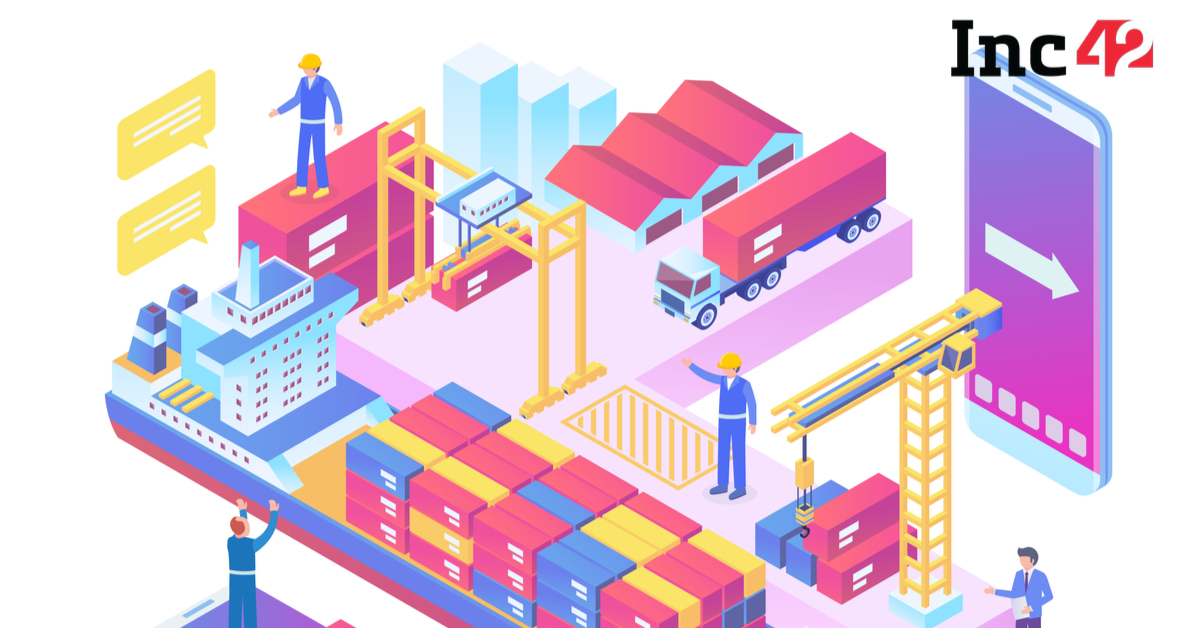Groups of logistics and delivery based startups are pooling resources to procure and deliver essentials
Many have taken to social media and private messaging channels to seek collaboration from the industry
Startups are seeking to offer help with delivery optimisation where the medical infrastructure is currently challenged
As India continues to struggle with an acute shortage of medical oxygen supply, the startup ecosystem has started mobilising resources to help address the situation. Startup founders have mobilised WhatsApp groups to pool resources, donations and essentials alike. Some groups are trying to put together delivery resources to help optimise oxygen cylinder supplies across the country. This despite there being no clarity on the regulatory approvals for private players on the extent of medical essentials that they can import or transport.
For instance, Delhi NCR-based logistics unicorn Delhivery has reached out to businesses seeking to help companies in need of essentials from abroad. The company’s officials, including the management, have been reaching out to the startup ecosystem via social media to provide logistics support.
Delhivery is also flying chartered cargo planes from international locations next week, including China. It has reached out to businesses seeking to import oxygen concentrators and other essential supplies for collaborations.

According to Nitin Goyal, cluster head for North India imports at Delhivery, the company is planning chartered flights on April 28 and April 30 from Shanghai to Delhi. When asked how people looking to import medical resources can seek the company’s help, he said “You can ask them to connect with me on [email protected] I can help them to give end-to-end logistics support for deliveries from China to India. I would need some details like handover date, number of cartons, dimensions, CBM etc to calculate what volume and capacity can be availed.”
Currently, the biggest problem faced by the medical infrastructure is the lack of timely delivery of oxygen cylinders to patients. Maharashtra is the largest producer of oxygen in India followed by Gujarat while MP has no oxygen manufacturing plant. The top two states are also the largest consumers of oxygen due to the high volume of covid cases reported. Inox Air Products, has 27 plants in India out of which four are in Maharashtra and three in Gujarat.
On April 22, the Supreme Court directed the central government to file a response on four critical issues. “We want to know with regard to four issues — supply of oxygen, supply of essential drugs, method and manner of vaccination. We want to keep the power to declare lockdown to the state and this should not be by judicial decision…,” the court said.
Some states, like Maharashtra, Haryana and MP are also witnessing cases of oxygen cylinders and tankers being seized or diverted, forcing them to provide police protection to oxygen tankers. Oxygen export data from the Department of Commerce showed that India exported twice as much oxygen to the world during the first 10 months of FY21 compared to FY20. India had exported 9,301 metric tonnes (MT) of oxygen across the world between April 2020 and January 2021 compared to 4,502 MT of oxygen in FY20.
According to Dhruvil Sanghvi, CEO of Loginext, a logistics intelligence startup, companies of various sizes and stages are mobilising delivery partners for this purpose. Sanghvi added that within Maharashtra, where the company is based, the startup community had reached out to the Brihanmumbai Municipal Corporation (BMC) to offer logistics support for oxygen delivery. But so far no direct collaboration between startups and regulatory bodies has materialised.
“We understand that the current problem is more about distribution rather than supply and a number of startup groups are trying to build resource pools for supplies. We are also in the process of launching a service in collaboration with over 50 delivery platforms in the country to help deliver oxygen cylinders,” said Sanghvi.
He added that the service is currently being tested and should be ready to go live by early next week. The service will integrate an oxygen delivery option in addition to the regular delivery requirements that the platforms address.
During the first wave, the demand for liquid medical oxygen (LMO) increased from 700 metric tonnes per day (MTPD) to 2,800 MTPD. But during the second wave, it has jumped to 5,000 MTPD, according to research firm Crisil.
Currently, patients and hospitals alike have taken to social media platforms to amplify their requests for medical essentials and oxygen cylinders. However, as state and central administrations struggle with supply and distribution of these resources, logistics startups with their technology-driven supply optimisation solutions are well placed to coordinate this demand, provided they get the regulatory go-ahead.
Deepsekhar Choudhury contributed to this story.










